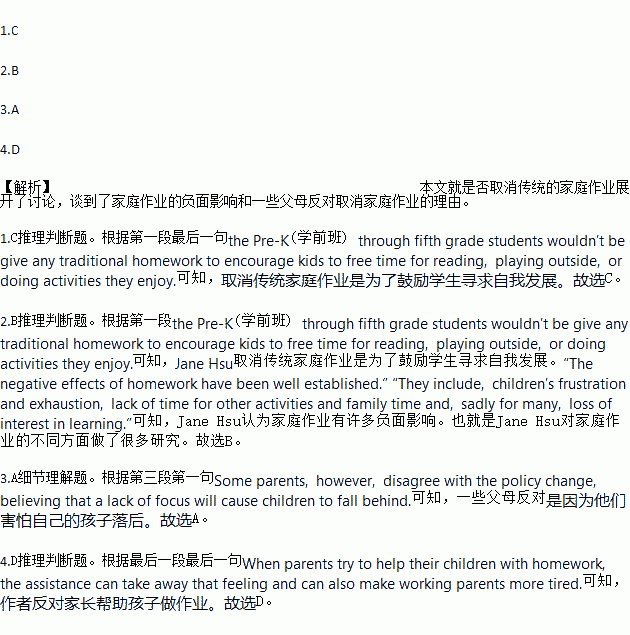题目内容
After a year of examining many studies concerning whether homework is effective, NYC P. S. Elementary School decided that math worksheets and essay assignments were actually a waste of time. In February, Principal Jane Hsu sent a letter to parents stating that the Pre-K(学前班) through fifth grade students wouldn’t be given any traditional homework to encourage kids to free time for reading, playing outside, or doing activities they enjoy.
“The negative effects of homework have been well established.” Hsu wrote in a note to parents. “They include, children’s frustration and exhaustion, lack of time for other activities and family time and, sadly for many, loss of interest in learning.”
Some parents, however, disagree with the policy change, believing that a lack of focus will cause children to fall behind. Homework has been part of education from the beginning, and has increased in amount in recent years.
Hsu’s advice that children should read and spend time with their families has upset some parents to the point of considering pulling their children out of the school. This group feels that homework gives children a goal to work toward. Others feel so strongly about the importance of homework that they have begun giving their own homework to their children.
An Australian Childhood Foundation survey finds that 71% of Australian parents feel they don’t spend enough quality time with their children mainly because of the time spent running the household or the time spent helping with homework. Education experts in Australia are saying that parents should stop helping. Doing so will give kids more independence, give parents more free time, and help reduce the number of arguments caused by homework in the family.
While some research suggests that homework has little academic benefit for elementary students, other researches show homework can help kids develop independence, and confidence. It can also contribute to a sense of belonging or control over their lives. When parents try to help their children with homework, the assistance can take away that feeling and can also make working parents more tired.
1.Cancelling traditional homework is aimed at ________.
A. allowing students to learn on their own
B. wising students to spend more time with parents
C. inspiring students to seek self-development
D. motivating students to help with homework
2.What can be concluded from the 1st and 2nd paragraph?
A. Jane Hsu is the first principal to cancel homework.
B. Jane Hsu has done much research on different aspects of homework.
C. Jane Hsu pays little attention to students’ academic records.
D. Jane Hsu knows students prefer activities to their subjects.
3.Why are some parents strongly against Principal Jane Hsu?
A. They are afraid their kids will fall behind.
B. They dislike their kids doing too many activities.
C. They have no time to give their children homework.
D. They don’t think the school is responsible for their kids.
4.What is the author’s attitude to parents’ helping kids with homework?
A. Supportive. B. Worried. C. Unconcerned. D. Negative.
 阅读快车系列答案
阅读快车系列答案
